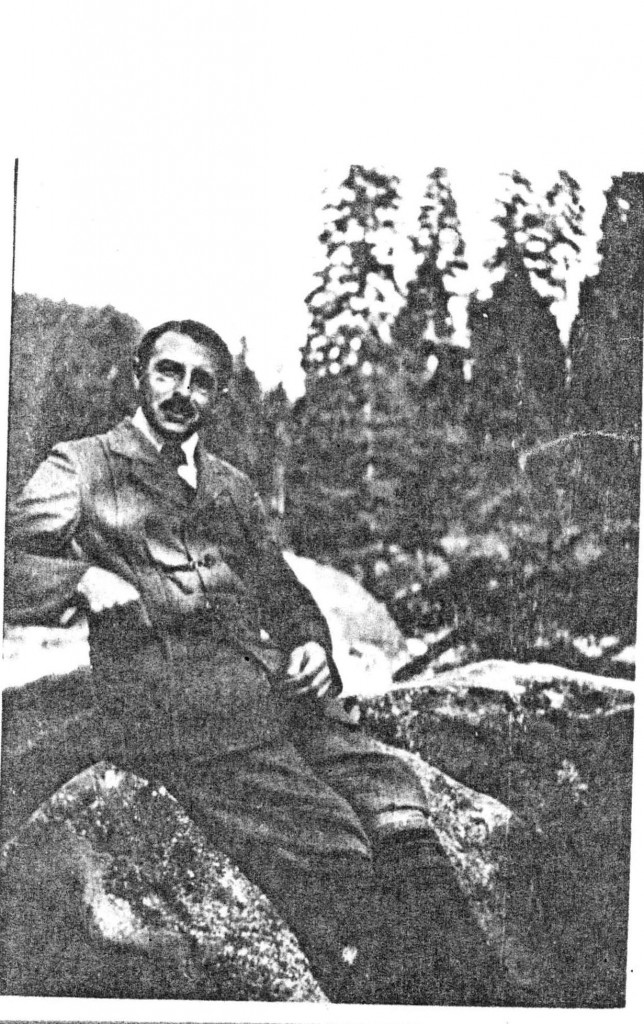Today in 1917 Reinach died on the battlefield just outside Diksmuide in Flanders, Belgium.
In a conversation with Edith Stein and Fritz Kaufmann about his enlistment in the army, Adolf Reinach said: “it is not that I must go; rather I’m permitted to go.” After Germany’s declaration of war on France in the summer of 1914, Reinach, like many German intellectuals, immediately volunteered for the army with great enthusiasm, even attempting to exercise pressure to be admitted as quickly as possible. He was recruited in his hometown of Mainz in mid-August, and after two weeks of training he was assigned to the Reserve Battery, specifically the 21st Field Artillery Regiment of the 21st Reserve Division under the command of his younger brother, Heinrich. This platoon consisted of two field guns. By February of 1915, he was fighting in the trenches against France, and later he received the Iron Cross for his efforts during this time. In a letter to Theodor Conrad and Hedwig Conrad-Martius postmarked 5. 11. 1915, he recounts the event:
“Before, my brother and I were with 2 heavy field guns on Hill 191. We lost both the hill and the artillery. But we left the guns only when our infantry was already behind us and we were in danger of being shot at by our own artillery. When we went back to the battery we came across another German battery that was already abandoned by the gunners and we mounted the field guns and shot at the advancing Frenchmen until night fell. There were often terrible hours, in which one settled one’s accounts with life. But this was nevertheless the proudest time in my life. And that’s the reason why my Iron Cross, which I received exactly for days like these, means so much to me.”
After this courageous event, he was promoted to Assistant to the Sergeant Major of the 9th Battery of the 185th Field Artillery, a position more to his liking: “How much nicer it is to be the unit leader in an active regiment, instead of the section leader in a platoon of the Reserve Regiment.” In a letter to Husserl dated 1. 12. 1915, he mentions he took part in “The Big Offensive” (also known as the Second Battle of Champagne) from 22 September – 6 November 1915.
By December of 1915, Reinach is stationed in Belgium. In a letter to the Conrads dated 5. 12. 1915 he describes the beauty he is surrounded by. He really seems to enjoy his 4 weeks in Beverloo, and his Sunday travels to Brussels, Antwerp or Leuven. Even the fighting seems almost enjoyable! Later, in a letter to Conrad-Martius dated 24. 10. 1916, he writes:
“Because all the components of the new-formation come from the Battle of the Somme, partly from the Battle of Verdun, and so at the moment we have calm, a large, nice, quiet town on a wooded hill with a wonderful view at our feet. I have very pleasant comrades, tolerable superiors and capable subordinates, and feel very comfortable. With the French we have tacit but strictly followed agreements. To shoot in the mornings is considered impolite. Shooting time for respectable people is from 3 – 6. During nighttime you have to be quiet. Calibers larger than 9 or at most 12cm are frowned upon – it is delightful! Also the trenches are so peaceful that you believe that you have been relocated to the base.”
The last letter the Conrads receive from Reinach was dated 12. 11. 1917. It was a very brief letter, the shortest he ever wrote to them and it contained a photograph. It said,
“I am the man with the belly.”
4 days after this letter was posted Reinach died.

(Sincerest thanks to Dr. Thomas Vongehr for this picture and his assistance with translating the WWI letters between Reinach and the Conrads.)